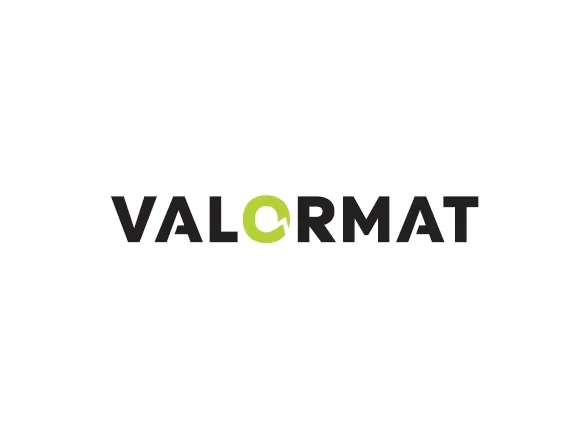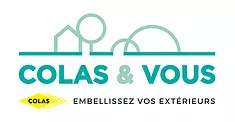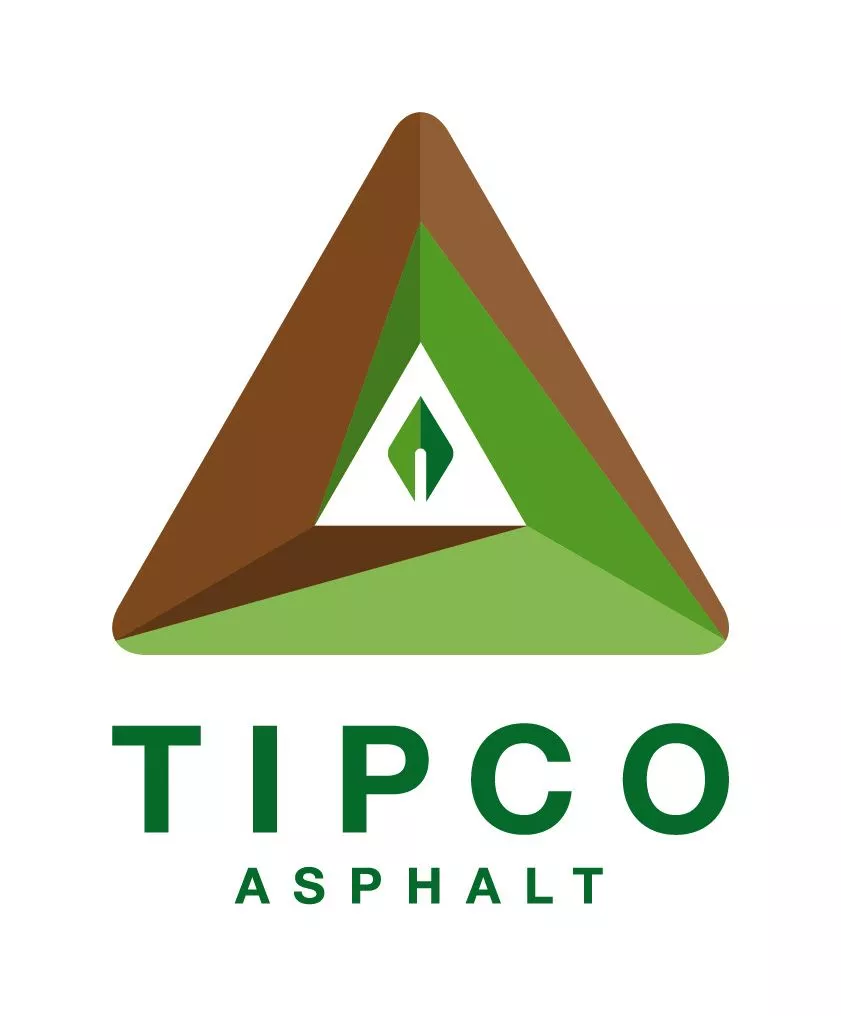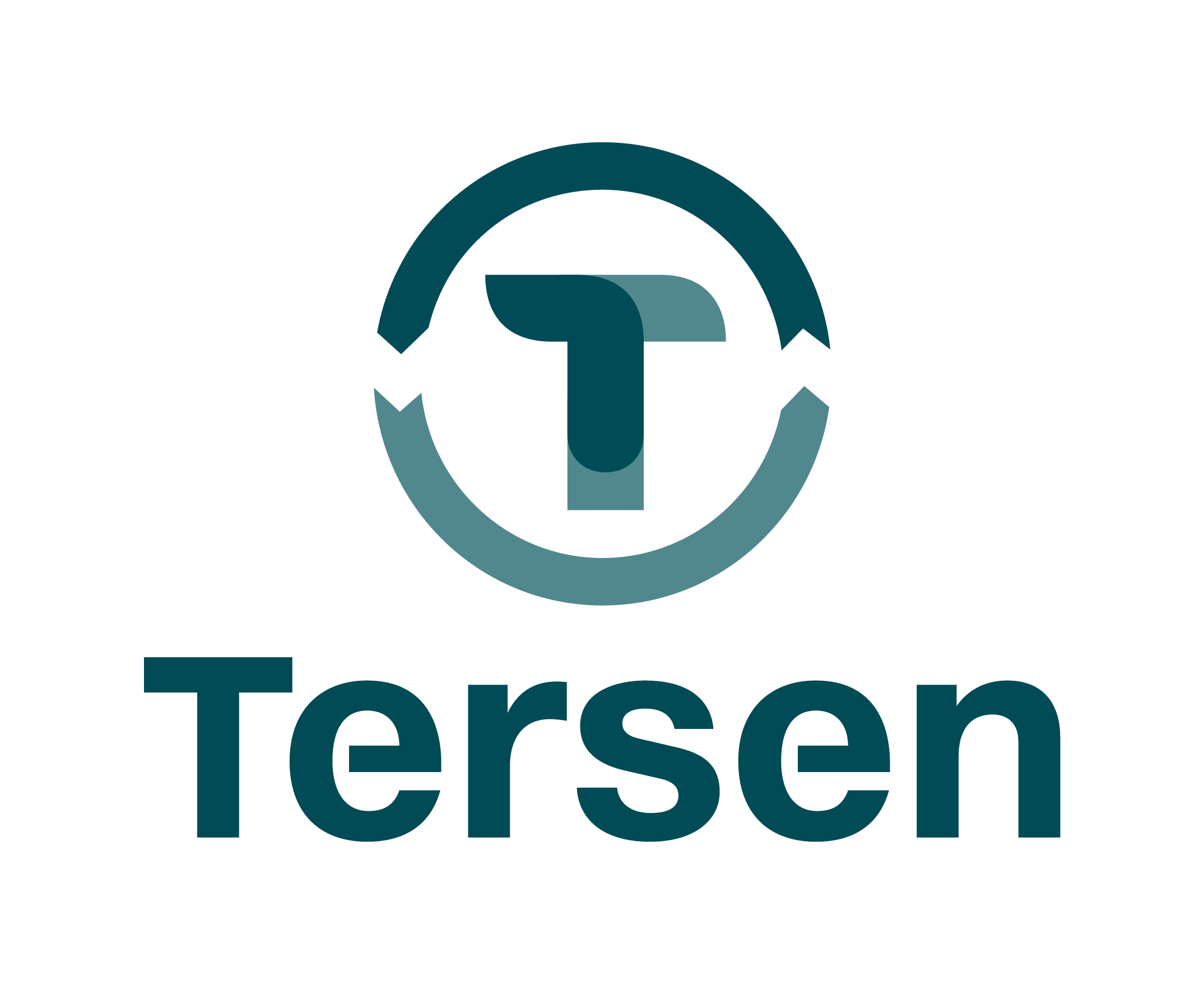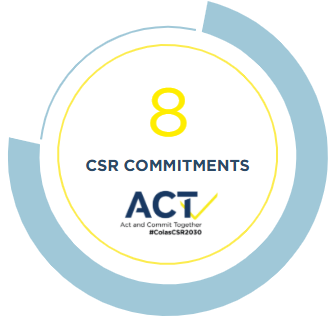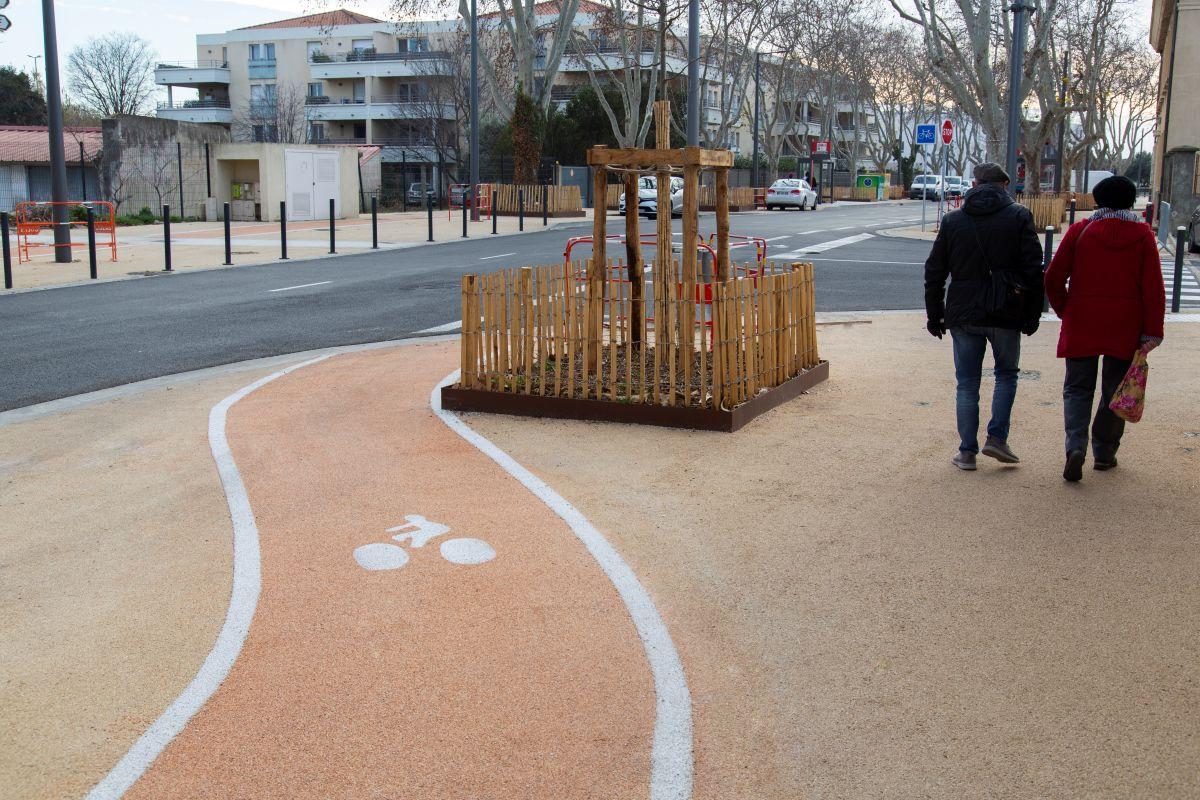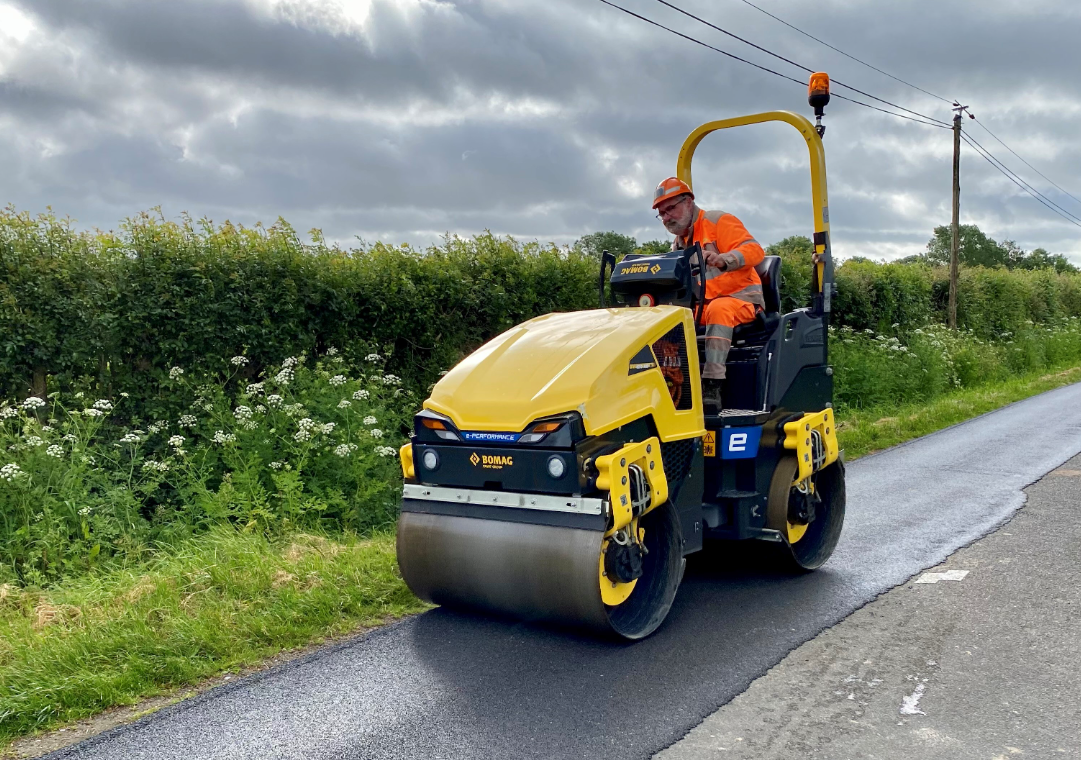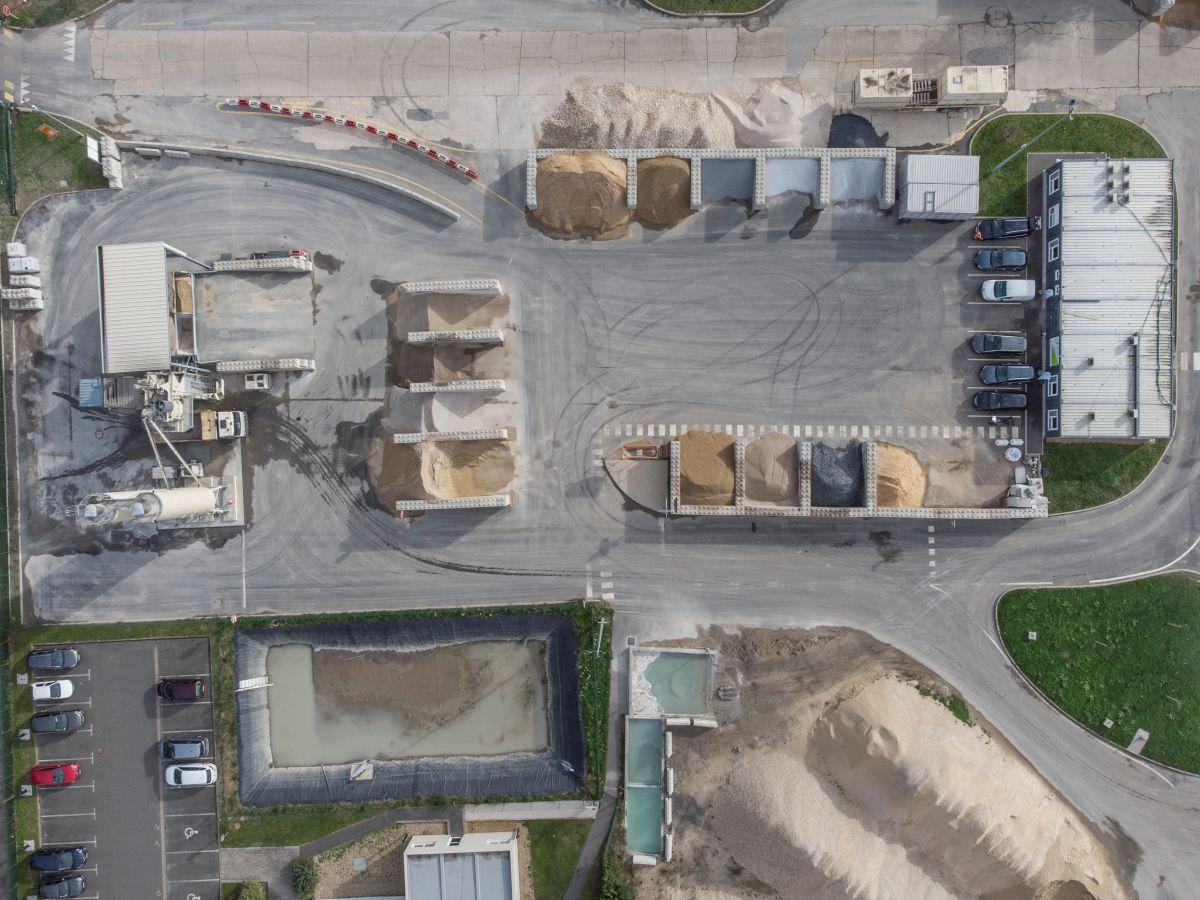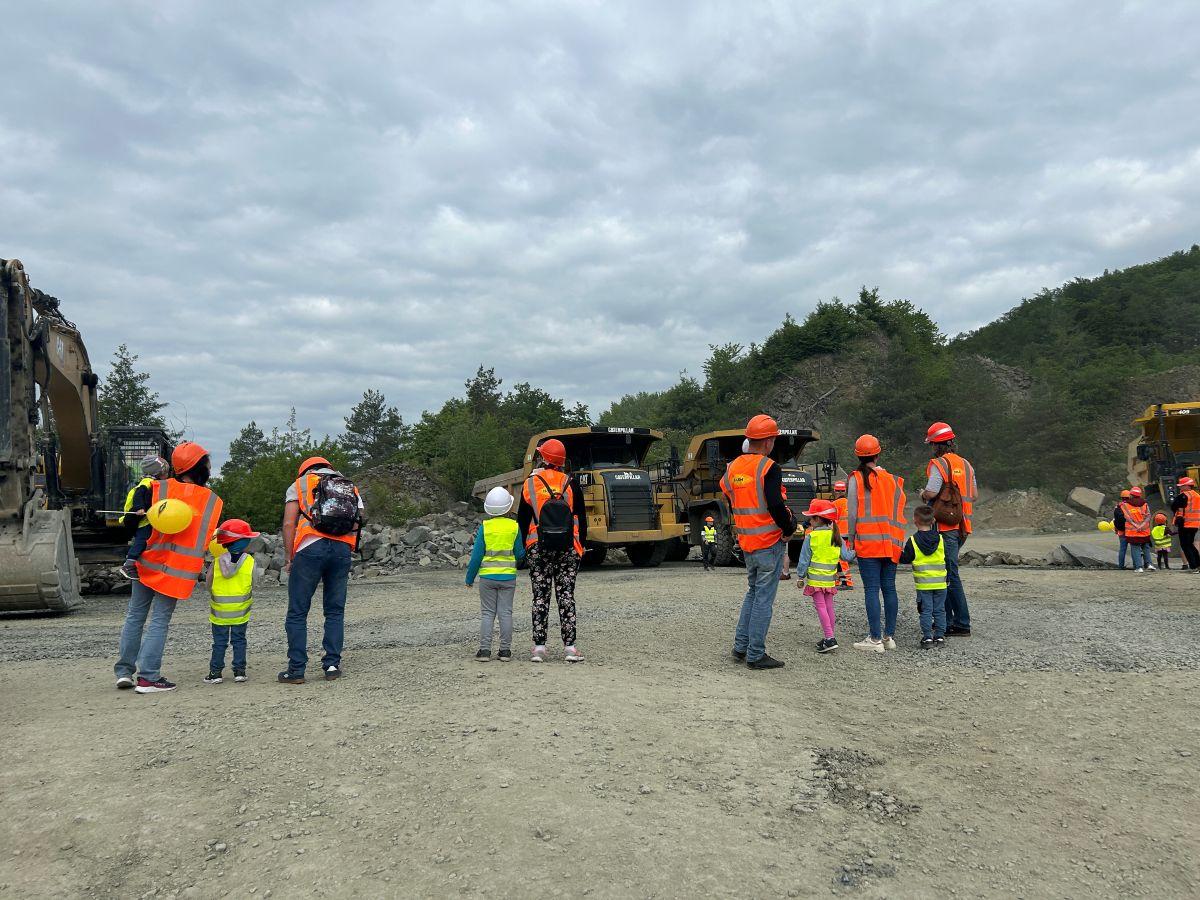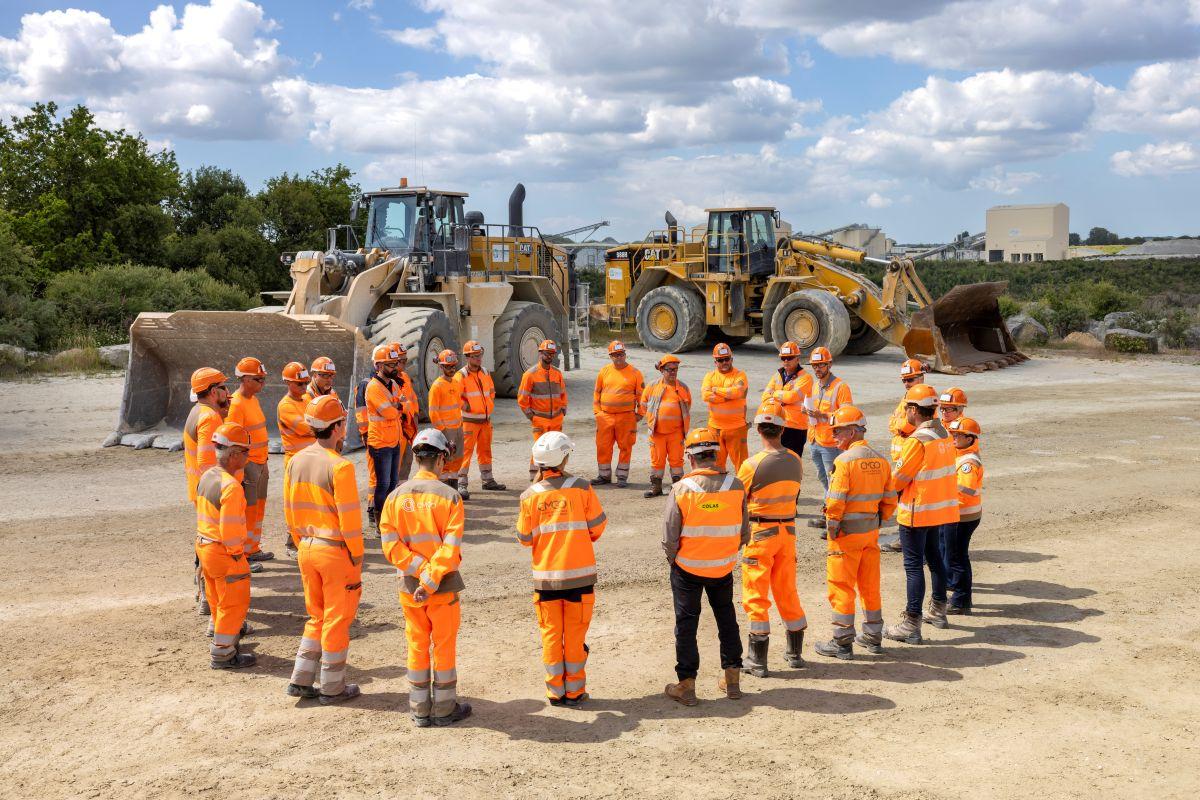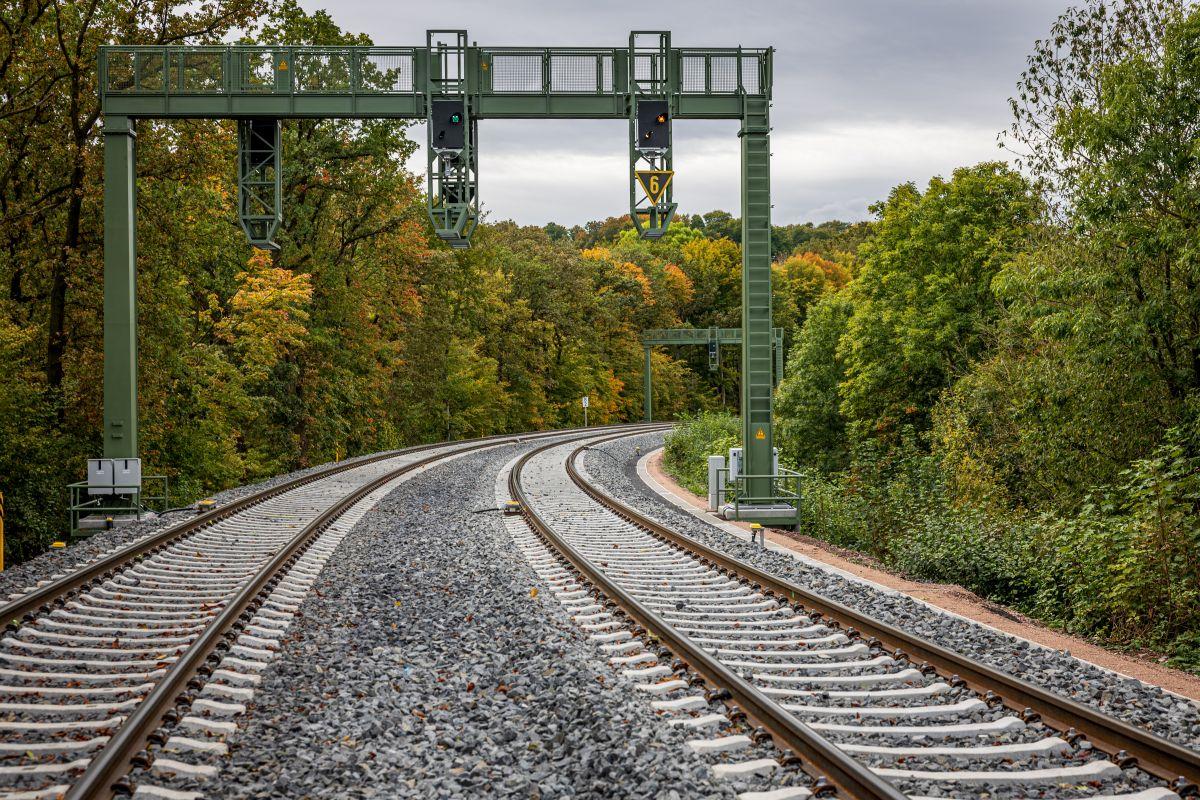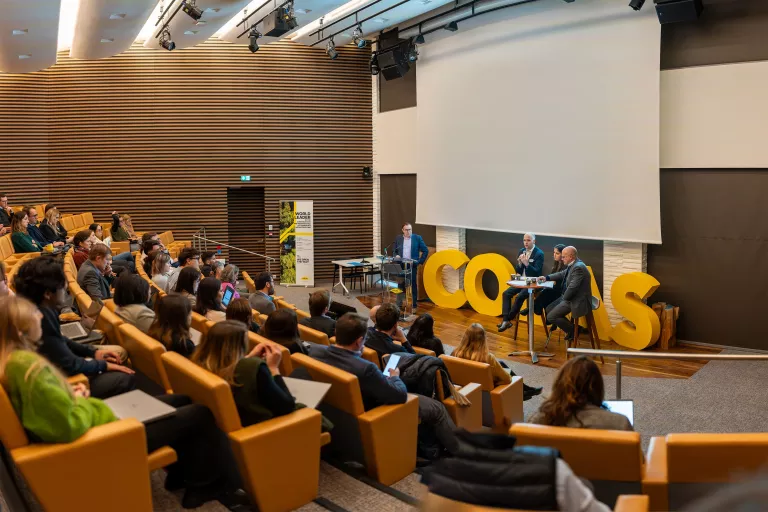Our CSR Commitments
Against a backdrop of far-reaching transformations (climate change, resource scarcity, social developments, population growth, new forms of mobility, etc.), our stakeholders have increasingly high expectations.
To address the major societal issues associated with sustainable development, Colas has made social responsibility an integral part of its strategy via its ACT project, built around eight pillars. The objective is to anticipate and adapt its activities to the challenges of tomorrow.
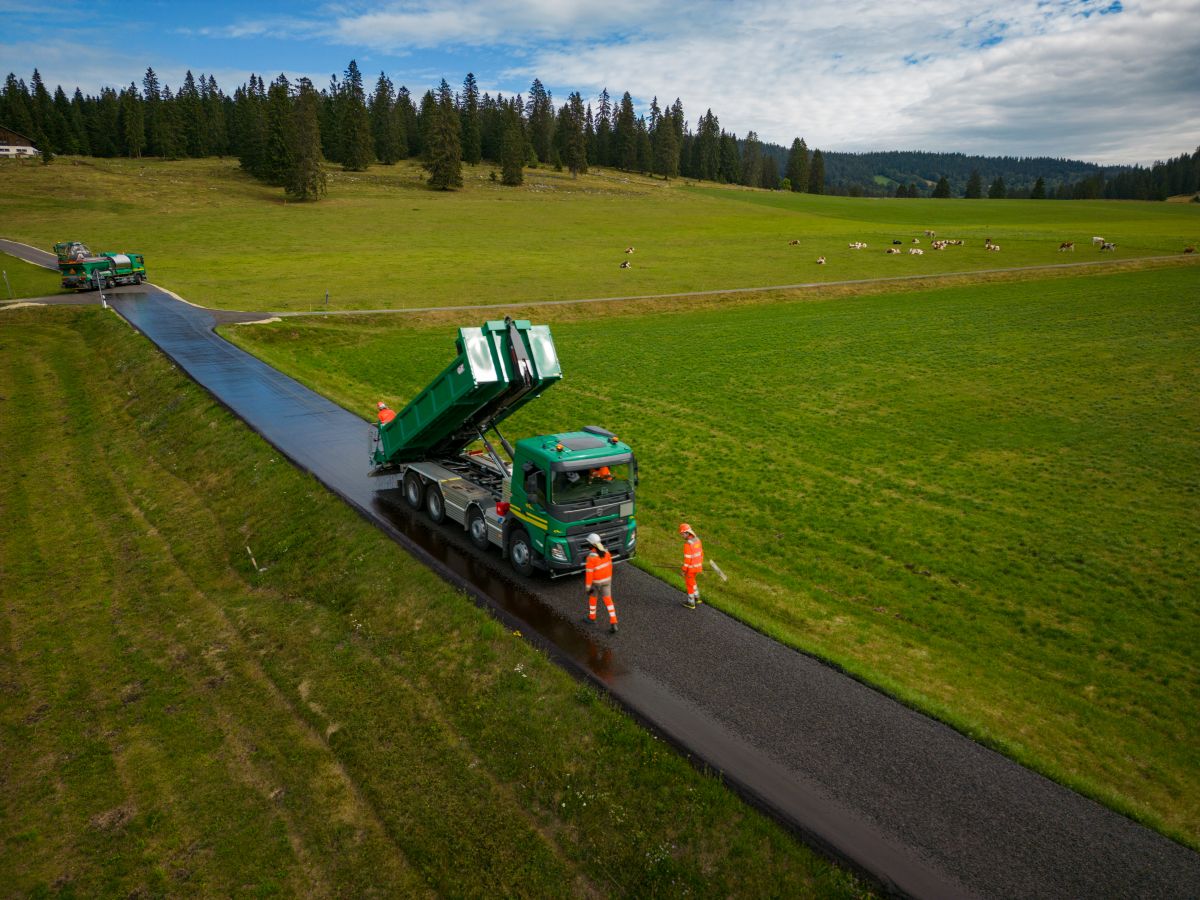

Our CSR commitments are our compass, helping us to navigate our way along Colas’ development path. They guide our strategic decisions and provide a framework for everything we do as a responsible company, ensuring, for example, that we conduct our operations safely, or that we offer our customers lower-carbon solutions.
Pierre Vanstoflegatte
CEO of Colas
ACT, a Project that Addresses Colas’ Societal Challenges
For more than 20 years, Colas has been implementing a social responsibility approach that takes onboard the major challenges associated with sustainable development, with numerous local initiatives led by its teams around the world. In 2021, this approach was given a formal structure within an ambitious project, dubbed ACT (Act & Commit Together). The project is based on eight CSR commitments to the Group's stakeholders.
ACT aims to give meaning to, better coordinate, promote, and raise awareness of the actions set out in our eight roadmaps, through concrete achievements, monitoring indicators, and transparent communication. It also aims to encourage the active involvement of all stakeholders, reinforcing their sense of engagement and responsibility within this collective transformation process.
Governance of Our CSR Commitments
The CSR Department drives and rolls out the ACT project. Each CSR commitment has been assigned a dedicated leader responsible for implementing their roadmap, working closely with theme coordinators within the business units. These coordinators are then responsible for rolling out actions and monitoring their progress in their own entities.
Colas’ teams around the world are fully mobilized to roll out the eight CSR commitments made by the Group.
Our Main CSR Indicators
Our Main CSR Indicators
Offering Our Customers and Users Solutions that Meet the Challenges of Sustainable Development in Local Communities
Environmental, climate-related, and societal challenges, along with changing lifestyles, bring with them both constraints and opportunities for Colas. To address these, the Group is permanently innovating to develop adapted products and services. We aim to be the trusted partner of our customers and communities in their mobility infrastructure and sustainable development projects.
Products and Services Supporting the Sustainable Development of Communities
Colas focuses on innovation to rise to the challenges of sustainable development, drawing on the expertise of its technical teams and its dedicated R&D facility, the CORE Center. The goal is to design products with a reduced carbon footprint, and that promote the circular economy. The innovative solutions developed include substituting a bio-based binder for bitumen, replacing cement with an alternative binder, and incorporating high levels of RAP into materials.
Colas offers innovative services that are part of a global vision of infrastructure management: Infracare, for preventive road maintenance based on AI, Hello Travaux, a mobile app dedicated to dialogue with local residents during construction work, Qievo, a mobile app designed to optimize logistics flows.
Supporting the Low-Carbon Transition
Colas develops and markets more responsible mobility solutions designed to address the environmental, societal, energy, and densification challenges facing its customers:
- Public transport with a reduced carbon footprint (metro, tramway, BRT, cable cars, etc.);
- Active mobility: bike paths, greenways, pump tracks;
- Renewable energies: wind, solar, hydrogen, methanization, biogas, etc.
Rolling Out a Low-Carbon and Biodiversity Strategy
In response to the climate emergency and the challenges posed by the loss of biodiversity, Colas has developed a low-carbon and biodiversity roadmap with ambitious targets of reducing its greenhouse gas emissions by 46.5% for scopes 1&2 and 30% for scope 3a by 2030, in line with the Paris Agreement and validated by the Science Based Target Initiative (SBTi).
Decarbonization Levers
To meet these targets, we are working to reduce the consumption of all the Group's entities via:
- Lowering asphalt mix production temperatures;
- Using biofuels (B100, HVO);
- Improving energy performance at asphalt mix plants;
- Recycling asphalt mixes, resulting in resource savings and reduced greenhouse gas emissions (scope 3a);
- Integrating a bio-based binder (scope 3a).
Biodiversity Preservation and Restoration
The “Quarry Biodiversity” program, launched by Colas for its quarry and gravel pit sites, is set to be extended to the Group’s other fixed-site activities. The objective is to put in place initiatives to promote biodiversity, with the support of scientific biodiversity experts, including ecologists. The program also incorporates an educational component aimed at local communities (residents and employees), particularly through local partnerships (for example, with the French National Forestry Office for tree planting and the French League for the Protection of Birds for monitoring specific bird species, such as sand martins and eagle owls).
Promoting Circular Economy Solutions
Reusing, repairing, and recycling have always been part of the Colas ethos. At its 750 recycling facilities around the world and on its infrastructure jobsites, Colas recovers and recycles waste and materials from deconstruction activities. Colas offers its customers circular economy solutions through its network of recovery and recycling facilities, as well as its solutions for recycling materials, reusing them, or extending the life of infrastructure.
Recycling Materials Drawing on R&D
Colas’ global R&D facility, the CORE Center, plays a central role in the development of innovative solutions, ranging from asphalt mix recycling to the use of bio-based binders. The circular economy is a core area of Colas’ R&D, spearheaded by its global facility, the Core Center. Research is focused on the recycling of road materials, the use of alternative and bio-based solutions, such as Vegecol® and Vegeroad®, and the recovery of industrial by-products. Colas also works closely with partners, such as in Chile, where grape marc is used to improve asphalt mix durability.
Offering Customers Circular Economy Solutions
Colas offers its customers circular economy solutions to extend the lifespan of pavements, reduce jobsite waste, and promote the recycling of materials. In 2024, the proportion of recycled asphalt pavement (RAP) reused in the production of asphalt mixes was 18%.
Colas also employs techniques like in-situ road surface emulsion recycling.
Developing Recovery and Recycling Facilities and Their Uses
In 2022, Colas launched two service offers in France - Ecotri et Valormat- via its 170 sorting and recycling facilities, open to both self-employed trades and building sector companies. These external customers account for nearly 70% of business at these sites. The objective is to increase the volume of recycled materials by 50% by 2026. Similar projects are also being developed outside France, particularly in the USA, where Colas subsidiary Barrett Industries is turning concrete waste materials into reusable blocks via Upstone Materials.
Reducing the Impact of Our Activities to Bolster Acceptability
Our activities are rooted in the communities where we operate, and their acceptability is essential to ensure their continuity, particularly in a context where environmental concerns are becoming increasingly important. Our in-house network of more than 70 environmental experts supports operational staff in the implementation of concrete initiatives to reduce their environmental impacts and works to maximize the acceptance of our activities.
Reducing the Impact of Our Facilities
To improve our environmental performance, Colas reduces its impacts by taking action from the design stage of its facilities and throughout the duration of their operation: spraying haul routes with water and using dust-free truck-loading systems in quarries, activated charcoal filters to reduce odors in asphalt plants, and the use of rainwater or recycled water in concrete production to conserve water resources.
At its urban jobsites, Colas reduces noise pollution by adapting its schedules and using quieter equipment, such as enclosed generators and electric machines. In rural areas, the company tackles the spread of invasive species by raising awareness among its teams, marking sensitive areas to prevent soil displacement, and applying specific treatments where possible.
Fostering the Social Acceptability of Our Facilities and Jobsites
Colas promotes local dialogue by organizing meetings with residents and authorities, and setting up systems for handling any complaints. The company also develops digital tools to provide the public with information about the progress of construction projects, blocked roads and diversions, and enable local residents to submit questions and report incidents.
Attracting, Developing, and Retaining Talent Through Managerial Excellence
With more than 64,000 employees in over 50 countries, Colas makes people central to its strategy. When it comes to social responsibility, we aim to attract talented people, develop skills, and retain employees, within a respectful, inclusive, and safe environment.
Attracting and Integrating Employees
All over the world, Colas has dedicated local teams to handle recruitment. The objectives are to optimize the visibility of job vacancies, structure the recruitment process, and promote internal mobility. The recruitment policy also promotes diversity and internationalization. In 2024, Colas was ranked first amongst construction sector companies and 17th across all sectors in the “500 best employers in France” rankings for the second year running.
Developing Skills
Colas proposes a broad range of training opportunities accessible to everyone. For its managerial staff, the Group has developed an in-house program: Colas University. There is also a focus on operational excellence and digitalization via programs such as Colas Share on the Road and profession-specific Academies. Finally, Colas has rolled out a set of managerial skills standards across all Group entities, used during performance reviews, in particular.
Attracting Talent
Colas has put in place concrete initiatives to create conditions conducive to an inclusive environment, such as the promotion of gender diversity and support for internal networks fostering diversity in general. Diversity standards have also been rolled out across the Group and anti-discrimination training courses have been delivered to more than 4,000 managers.
Lastly, Colas promotes the integration of people with disabilities through employee awareness campaigns and partnerships with relevant companies.
Managerial Excellence
Colas promotes employee engagement through an active listening approach. One example is the “Dialogue” perception survey, which revealed an engagement rate of 83% in 2023. In 2024, more than 600 initiatives were implemented locally following the results of the latest survey. For instance, in the USA, employees were invited to take part in “see it, name it, stop it” training courses promoting ethical compliance and safety.
Well-being, parenthood support, and 24/7 assistance initiatives are also being offered.
Fostering a Stronger Health and Safety Culture to Protect Lives
Employee health and safety are priorities for Colas. The Group is committed to reinforcing a global prevention culture, ensuring safe working conditions for all, employees, partners, and users alike. Security and crisis management also play a key role in protecting teams and operations.
Instilling the Health and Safety Culture for all Stakeholders
Colas pursues its goal of zero accidents by instilling a shared health and safety culture across all its entities through transformation programs, the adoption of common rules, and the implementation of regular training and drills. This approach is backed up by cybersecurity awareness-raising campaigns and compulsory training for all employees.
In terms of occupational health, the Group offers social security coverage and implements specific measures to prevent risks related to heat, noise, and repetitive strain injuries.
Adjusting Security and Crisis Management Strategy to the Evolving Global Geopolitical Environment
Colas adapts its security strategy to reflect geopolitical tensions and protect its employees out in the field. Continuous geopolitical intelligence activities, stress management training, and security plans are tools used to combat threats. The Crisis Management Manual and the Security Managers network guarantee a rapid and coordinated response.
Building a Responsible Supply Chain Rooted in Sustainable Performance
Colas’ external expenditure amounts to more than 68% of its revenue and involves more than 100,000 suppliers and subcontractors. Consequently, our CSR initiatives must extend to our partners, suppliers, and subcontractors. In this way, Colas works with them to build a more responsible supply chain, rooted in sustainable performance.
Prioritizing More Responsible Purchasing
Colas prioritizes responsible purchasing by integrating social and environmental issues right from the supplier selection phase. In the USA, surveys are conducted among field operators to better understand their needs and incorporate their feedback into calls for bids, thereby helping to improve their working conditions, particularly in terms of health and safety. In France and Côte d’Ivoire, Colas Rail promotes the use of sustainable materials, such as recycled steel rails manufactured in low-carbon electric arc furnaces. These rails are used in major projects, such as line 15 of the Grand Paris Express project and the Sitarail project in West Africa.
Incorporating the Value Chain
Colas evaluates the CSR performance of its suppliers using a risk map, evaluation questionnaires, and the EcoVadis platform. In 2024, 340 strategic suppliers were assessed on their CSR performance. Where necessary, action plans are put in place to improve this performance, particularly to incorporate environmental criteria in offers, such as the carbon impact of products.
Shaping an Exemplary Culture of Ethics and Compliance
Ensuring that Colas employees and third parties work in line with business and managerial ethics is essential in upholding the Group's values. Colas reinforces its compliance culture by identifying risks of corruption and human rights violations, communicating ethical and compliance rules, and implementing controls to ensure that ethics and compliance procedures are followed correctly.
Identifying Risks of Corruption and Human Rights Violations
Colas has signed up to the United Nations Global Compact and takes steps to prevent risks of discrimination and forced labor, particularly in its purchasing practices. Third-party assessment is based on a three-tier control system (operational, legal, and audit), with more than 10,000 companies analyzed in 2024 using the Compliance Catalyst tool. Ethics are central to our corporate culture, underpinned by the Compendium of Compliance Procedures, communication initiatives, dedicated training, and the integration of the Code of Ethics and compliance rules into our internal regulations, accompanied by penalties in the event of non-compliance.
Communicating and Rolling Out Ethical Conduct Rules
Internal communication is based on information-sharing tools such as Colas Share, training, and communication campaigns. Regular communication campaigns and an annual Group-wide Compliance Day event reinforce the ethics culture. Thousands of employees have benefitted from training in this area, including “Ethics and Applied Compliance” and “Fair Play” modules.
In 2023, a digital platform was launched enabling employees to submit incident reports. The Group encourages staff to express themselves freely and therefore has rolled out a secure system for collecting and processing whistleblowing alerts. This platform is freely available and guarantees the confidentiality of the whistleblower, the identity of the person implicated in the whistleblowing alert and of the information obtained. See the whistleblowing platform


